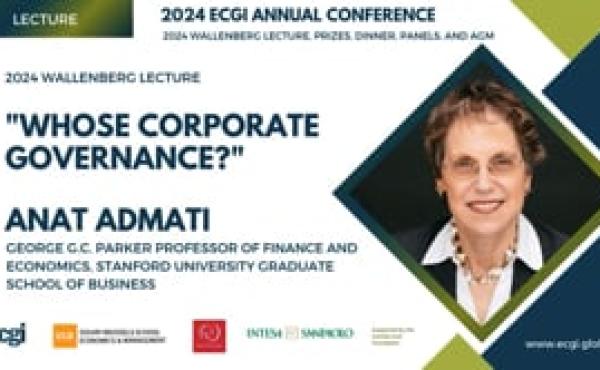
The ECGI blog is kindly supported by

Reflections on the 2024 Wallenberg Lecture: Whose Corporate Governance?
The 2024 Wallenberg Lecture was delivered on 8th October by Prof. Anat Admati (Stanford University and ECGI). The lecture, “Whose Corporate Governance?”, offered a deeply critical and thought-provoking examination of corporate governance and its relationship with societal welfare. Drawing on her extensive experience with corporate accountability, particularly in the financial sector, Admati’s lecture challenged conventional perspectives on governance. She argued that current structures often enable corporations, particularly large financial institutions, to evade accountability and externalize societal harms while prioritizing profits and shareholder returns. Her talk highlighted the urgent need for viewing societal corporate governance as a combination of external governance, which sets and enforces laws conferring both rights and duties for corporations and their agents, and the standard internal rules that are mostly the domain of corporate law. The overall governance challenge goes beyond economic outcomes and is fundamentally about basic justice and fairness.
Governance Failures in the Financial Sector
Admati began by highlighting systemic failures in the financial sector, where regulatory loopholes, high leverage, and complex corporate structures allow banks and large corporations to shift downside risks to others, exploit subsidies and evade responsibility. Through examples like HSBC’s involvement in money laundering and Wells Fargo’s unauthorized accounts scandal, Admati illustrated how current governance frameworks fall short in curbing reckless and unethical corporate behavior.
Her insights into compensation structures shed light on one of the underlying incentives driving this behavior. Admati argued that short-term bonuses and performance incentives are structured to reward executives for risky behavior that “front loads” measured gains without accountability for potential losses down the line, which shareholders and others will bear. This misalignment of incentives, she suggested, entrenches a culture of risk within financial institutions, as documented by many books on the subject. Her critique called for a realignment of compensation structures, proposing that executive rewards should reflect long-term impacts, possibly by being deferred substantially to foster a culture of more sustainable decision-making within financial organizations.
Corporate Personhood and Limited Liability
A key aspect of Admati’s observations centered on the legal concept of corporate personhood and limited liability. Corporate law allows corporations to operate with significant freedoms but limits the liability of executives and shareholders that may arise from corporate actions. This legal framework encourages innovations and enables beneficial risk taking, but it also can give rise to misconduct and harmful behaviors with too little accountability. Companies enjoy many legal rights but do not always fulfil the accompanying responsibilities. Citing cases such as Purdue Pharma’s role in the opioid crisis and Volkswagen’s emissions scandal, she demonstrated how limited liability, combined with the difficulty, or unwillingness of authorities to hold individuals accountable for corporate misconduct and harm enables corporations and their managers to find harmful actions profitable. Detection of misconduct, and any legal consequences, often take many years, and the typical result is settlements where fines are often too small to create deterrence and are viewed as “cost of doing business.”
Common approaches to law enforcement as it applies to corporations relies significantly on voluntary compliance program and on internal investigations, often managed by law firms and shared with legal authorities, that help corporations lower their own fine, shield high level executives, and, if authorities demand it (such as by the US Department of Justice) in order to receive “cooperation credits,” corporations attribute blame to lower-level employees. This system, she suggested, perpetuates systemic issues and presents a superficial appearance of accountability while failing to address root problems within corporate culture and governance.
The Role of Regulatory Arbitrage and Global Standards
Admati also examined the challenges of regulatory arbitrage, ways to take advantage of any loopholes or vagueness in the rule, which can spill into outright wrongdoing or crime. She pointed to the European Cum-ex tax fraud scandal, where many bankd across Europe defrauded their governments and effectively robbed European governments of many billions in taxpayer money. (The current estimate is a total of €150bn across a number of governments, including €36bn in Germany alone.) Transnational money laundering illustrated the difficulties of enforcing accountability in a global economy where corporations operate across multiple legal systems and may develop symbiotic relations with a home nation. For example, UK authorities pressured US authorities to avoid imposing harsh penalties on HSBC for laundering many billions of illegal drug-related money.
In her call for more robust external governance, Admati acknowledged the political complexities that often hinder international coordination. Nonetheless, she argued that developing effective frameworks for corporate accountability, and collaborating globally on rules and enforcement is essential. If cross-border collaboration is challenging, governments can still individually focus on their own tools and capacities to protect the public.
The Power of Corporate Influence and “Beautiful Lies”
A striking element of Admati’s lecture was her analysis of how corporations leverage public relations and lobbying to shape public discourse, obscure the issues and distort the rules. She introduced the concept of “beautiful lies”— carefully crafted narratives corporations use to present an ethical and responsible image while often engaging in practices that contradict their public commitments. For instance, corporations may issue ambitious environmental pledges or espouse commitments to social justice, but without substantive changes to their operations or practices. This approach to “culture washing,” Admati argued, undermines the credibility of corporate social responsibility efforts and perpetuates pretentions rather than meaningful change.
Admati further pointed out that corporate lobbying powerfully shapes legislation, allowing corporations to influence policies in ways that protect their interests. This influence often exploits lack of familiarity with the issues, which can be wilful if policymakers find it convenient to collaborate and avoid challenging corporations and their leaders. In the bargain, the public may well lose without even realizing it. Her critique called for stronger checks on corporate lobbying and a regulatory environment that prioritizes transparency and public welfare over private interests and relies more on competent and unconflicted experts who can communicate effectively and educate the public so it can demand better from policymakers as well as corporations.
Toward a Holistic Governance Framework
Admati’s lecture was a powerful call to rethink governance frameworks to account for corporations’ impact on society and consider all available tools, particularly strengthening external governance mechanisms. She advocated for multi-layered reforms, including appropriate oversight, revised liability laws that limit the ability of corporations to shield themselves and their leaders, and greater transparency in corporate operations. Her proposal for a “governance of governance” framework suggested that society must demand that governments and their decisionmakers act in the public interest, starting with elected officials and including regulators. A holistic approach in which governments set and enforce effective laws would help align corporation and their decisionmakers with public interest goals. The aim is for a system where accountability is embedded at every level—from internal culture to external regulatory frameworks.
One of her most compelling arguments was the need for stronger external governance that doesn’t solely rely on internal board oversight or shareholder activism. While internal governance is geared towards aligning incentives within the firm, Admati emphasized that unless corporations are properly accountable to society, the internal alignment can actually exacerbate societal harm as corporations will find it in their interest to compensate managers to commit profitable misconduct even if it cause harm, and then insulate them from consequences. Any governance framework that relies entirely on internal governance to achieve society’s goals is bound to come significantly short unless external rules compel corporations to internalize the external costs they impose on society, thus making misconduct less attractive.
Admati’s Wallenberg Lecture was a clarion call for a fundamental reassessment of corporate governance, urging attention, rather than ignorance of external governance as it interacts with internal governance mechanisms. By addressing the limitations of current frameworks that is based almost entirely on internal governance Admati’s insights challenged the audience to think beyond the standard narrow approach. Effective governance must integrate ethical, legal, and regulatory dimensions to ensure that corporations contribute positively to society and it respects and welcomes the proper role of external constraints to help corporations serve society and avoid profiting at the public expense.
_______________
This article is Part Five of a seven-part blog series covering insights and reflections from the 2024 ECGI Annual Conference.
Explore the rest of the posts: read Part One, read Part Two, read Part Three, read Part Four, read Part Six, and read Part Seven.
Related materials
The 2024 Wallenberg Lecture was delivered by Prof. Anat Admati (Stanford University and ECGI). The lecture, “Whose Corporate Governance?”, offered a deeply critical and thought-provoking examination of corporate governance and its relationship with societal welfare.
Access the presentation slides here.






